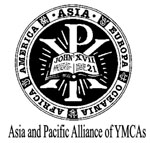|
On the second day on 16 August, the forum was held at the UN Conference Center situated in the UN Office, with a view to have an open dialogue between the Civil Society Organizations (CSOs) who are working on SDG 16 and the UN officials. The purpose of the meeting was to appraise the UN about the CSOs initiatives for the implementation of the SDGs. Ambassador Lim Jae-hong, from the UN Project Office of Governance, Seoul, Haidy Ear-Dupuy from Asian Development Bank and Shreya Basu, from Open Government Partnership (OGP) were panel presenters at the session. Hieke Alfefsen, from UNDG, AP Regional Human Rights Adivsor and Beniam Gebresghi, Advisor on Youth and Civil Society, UNDP Bangkok Regional hub also participated in the dialogue.
One of the main issues discussed in this session was the reluctance of the governments to work jointly with the CSOs especially in the developing countries. It was understood that in major cases the governments are working with their own plan to implement the SDGs, on the other hand, if the CSOs were integrated with the government initiates on SDGs, the results would be much more higher. One of the responses from the UN to this issue was the Open Government Partnership (OGP) which is a new UN partnership platform creating space for CSOs to work with the Government. There are eligibility criteria for a government to participate in this program, though 70 countries are now in the process to participate in this platform, however, only a few countries have been accredited for this. The issue of ‘freedom of expression’ and ‘right to information’ are among main criteria for membership of any country. The member countries of this platform needs to make a two years national action plan how they will incorporate the CSOs in the government mechanism for implementing development work. This session concluded with the hope that the quest shall continue in search of an open space in the UN system for the CSOs to work in collaboration with the UN and also work for creating an open space for the CSOs at the country level to work with respective governments, and all the UN organizations speaking in one voice for creating that space and CSOs having easy access to the UN system.
This session also followed with several parallel workshops, the themes of these parallel workshops were (i) Asia Development Bank, (ii) Open Government Partnership (OGP) (iii) Data Initiative and SDG 16 (iv)Scorecard Project (v) Inter-Faith/religious groups.
APAY had the opportunity to conduct the workshop on Inter-faith / religious groups jointly with ACT Alliance and Soka Gokkai International. A good number of delegates participated at the workshop including World Vision, Islamic Relief Organization, National Justice Commission of Pakistan and other organizations. We were able to give the message to the general participants to make them understand that the faith based organizations work for all humanity, irrespective of any caste or creed or religion, though their works are inspired by the core values of their respective faith.
In my presentation I had the opportunity to share the YMCA history, its activities around the world, some statistics about the YMCA and APAY in particular and also our contemporary mission statement the Challenge 21. I also attempted to develop a synergy between the Challenge 21 and the Millennium Development Goals MDGs, to explain how the YMCAs were involved in working with objectives similar to the MDGs and now the SDGs.
Earlier, in the afternoon of 14 August 2016 the leading Asian civil society organizations meet together with a view to launch a new platform of the CSOs who are working in the area of Sustainable Development on SDGs. About 53 delegates representing various NGOs of Asia participated in the launching program. Most of these local NGOs are affiliated members of Asian civil society alliances like Global Call Against Poverty (GCAP), Asian Development Alliance (ADA), Forum Asia, Asia Democracy Network (ADN), Transparency, Accountability and Participation Network (TAP Network). In fact these Asian civil society alliances had initiated the new platform on SDGs.
According to the consensus of the meeting, a small task force comprising four members was formed to draft the terms of reference of the new forum. The new platform would be an open forum with liberal eligibility criteria. The name of the forum was fixed as Asia Partnership for Sustainable Development (APSD). The terms of reference of APSD shall be available within a few days to comment on it and finalize it thereon. The Board of APAY has already resolved that APAY to join this new Forum. The first meeting fo this new forum will be during May/June 2017 or October/November 2017. The ACSF on SD16 will be held in August 2017 as usual. Some of the regional alliances will be entrusted with the responsibilities of co-convening the new forum while there will be on focal person for coordination of the activities.
In conclusion, I would like to mention that participating at this forum was an opportunity for me to learn more about the dynamics of the Asian CSOs working for accomplishing the Sustainable Development Goals especially Goal 16, which talks about human rights, democracy, transparency, accountability, anti-corruption, etc.
APAY highly recommends our national movements, the national alliances of YMCAs be involved in networking with other CSO national alliances in their respective countries who are working towards accomplishing the UN Sustainable Development Goals. We can achieve our objectives more better when we network with other like-minded organizations, building alliances to reach our goals collectively. This effort also shall help us to enhance our resource mobilizations. Major donor agencies prefer networks to support for projects.
The interaction with the UN agencies is another opportunity for us to support UN initiatives which coincides our objectives. In fact, the YMCA is a member of the Economic and Social Council (ECOSOC) in the United Nations’ central platform for reflection, debate, and innovate thinking on sustainable development. The YMCAs should work more closer with the UN organizations at country level and regional level.
~ Duncan Chowdhury, Executive Secretary
APAY 3rd Global Citizenship Institute
Who is a global citizen? The realization to this question was recognized, reflected and acted upon by the nine young staff and volunteers from the National Movements of Bangladesh, Korea, Philippines and Sri Lanka who participated in the recently concluded 3rd Global Citizenship Institute held at Sanctuary House Retreat and Training Centre, Pamunugama, Sri Lanka last August 15-28, 2016 and was hosted by the National Council of YMCAs of Sri Lanka.
The education approach of the institute concretely expressed through theoretical and experiential learning provided an opportunity for the youth to learn about their inevitable participation in the existing social and economic processes. Such education and engagement called for a deepened critical thinking on social realities/issues on local, regional and global perspective, a strengthened value formation of compassion among the marginalized sectors; and a committed mobilization of youth to act towards creating a society liberated from injustices.
Through Global Citizenship Institute, knowledge and understanding of Globalization and Development Processes, Social Injustices and Inequities, Diversity and Sustainable Community Development are integrated alongside contextualized YMCA Mission and Leadership Principles. Specific activities such as interactive input presentation, dialogue with people’s movement, work group sessions, cultural exchanges, social program planning, project proposal writing and community- home stay exposure were maximized to provide practical skills and competencies needed in youth-led program implementation.
The participants were able to come up with realistic and attainable action plans that they are committed to actualize through the support of the movement at different levels. They are resolved that global citizens must strive for the following in order to fulfill the YMCA mission of building a human community of justice with love, peace and reconciliation for the fullness of life for all creation:
- Understand and be critical about the social issues affecting their immediate communities;
- Respect cultural, social, religious and political differences
- Promote human and ecological rights in order to achieve sustainable development for all
- Advocate for human development particularly the marginalized sectors more than economic gains brought about by globalization
- Nurture the values of integrity, caring, honesty and sharing
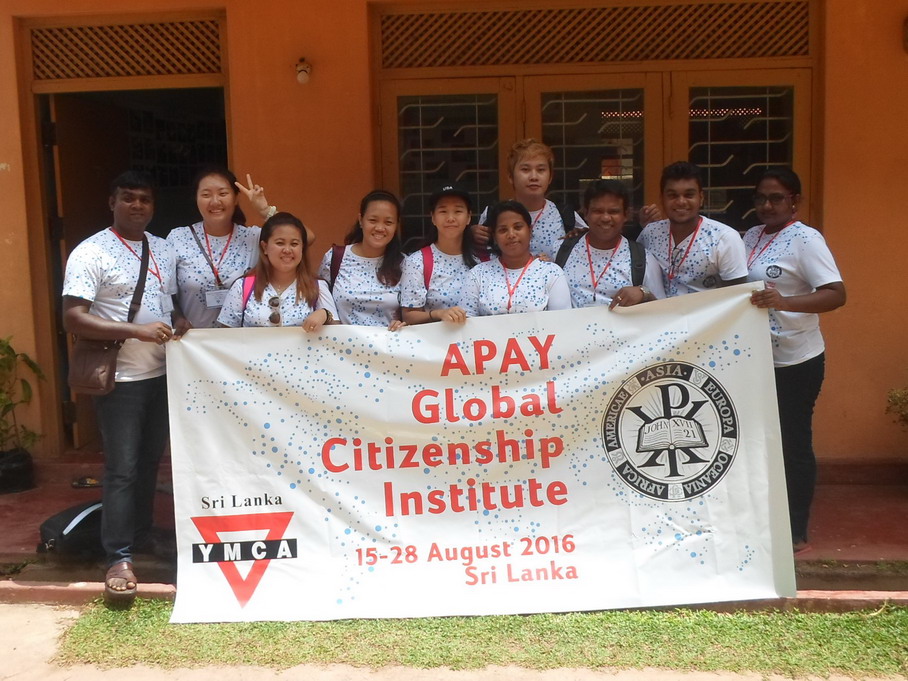 |
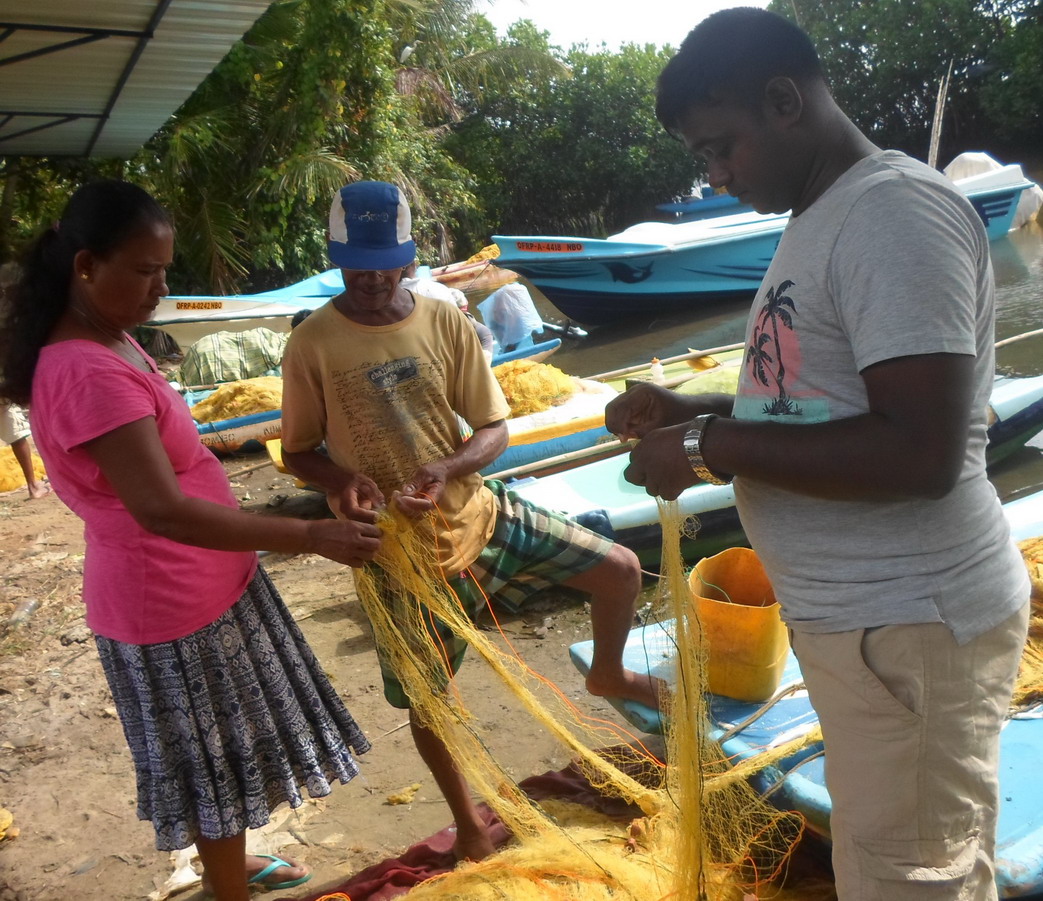 |
| ↑ Participants of the APAY 3rd Global Citizenship Institute |
↑ Toton Baroi (right), GCI participant from Bangladesh helps his host parents collect shrimps for livelihood |
~ Maria Cristina Miranda-Lastima, Executive Secretary
72nd International Convention of Y's Men International, Taipei, Taiwan
The YMI 72nd International Convention (IC) was held in Taipei, Taiwan from August 4 to 7, 2016 with over 860 Y’s men members, YMCA leaders in our region and special guests in attendance. From the Asia and Pacific Alliance of YMCAs (APAY), President Mr. Babu Markus Gomes and GS Mr. Nam Boo Won were invited as guests in view of strengthening the partnership between the two organizations with common missional thrusts.
On August 5, during the afternoon schedule, five workgroup sessions were held in parallel. One of them was about the “Partnership building between YMCA and Y’s Men”. There were about 50 participants in the group. Mr. Kohei Yamada, YMI’s liaison to World YMCA, Mr. Nam Boo Won, GS of APAY and Mr. Jose Varghese, Executive Secretary of World YMCA took initiatives in leading the group discussion.
Through the active discussions among participants, examples of good practices were shared such as: Y’s Men conducting fund-raising activities to support YMCA community service activities and youth empowerment; YMCA sending their staff member to Y’s Men as membership of Y’s Men; utilizing Alexander Scholarship Fund (ASF) for sending the YMCA staff members to their training programs; and YMCA and Y’s Men together conduct programs for young people such as change agents training or e-learning course on climate change. Good potential partnership projects were also suggested such as: conducting a joint training between the two organizations on topics of community services, youth empowerment or climate change issues; YMCA and Y’s Men can develop a common youth empowerment programs who will be future leaders of the two organizations.
During the convention, Taipei YMCA kindly hosted a fellowship lunch inviting YMCA leaders from our region who participated in this convention. Mr. Babu and Nam both enjoyed very warm hospitality rendered by Taipei YMCA during our stay in Taipei YMCA hotel. After the convention, President Babu was exposed to Taipei YMCA branches and their diverse activities and further down to Kaohsiung YMCA and Tainan YMCA accompanied by Mr. Gilbert Chin, Asso. General Secretary of Taipei YMCA. APAY is deeply grateful to Taipei YMCA (General Secretary Mr. James Tou) for their warm and friendly hospitality and care during their stay in Taipei. We also wish to express our gratitude to Mr. Tung-Ming Hsiao, Host Committee Chairman, and Mr. Nishimura Takao, ISG of Y’s Men International for the invitation extended to APAY.
~ Nam Boo Won, General Secretary
The 2016 Mini-School of Peace: Pray and Act for the Peace for Humanity
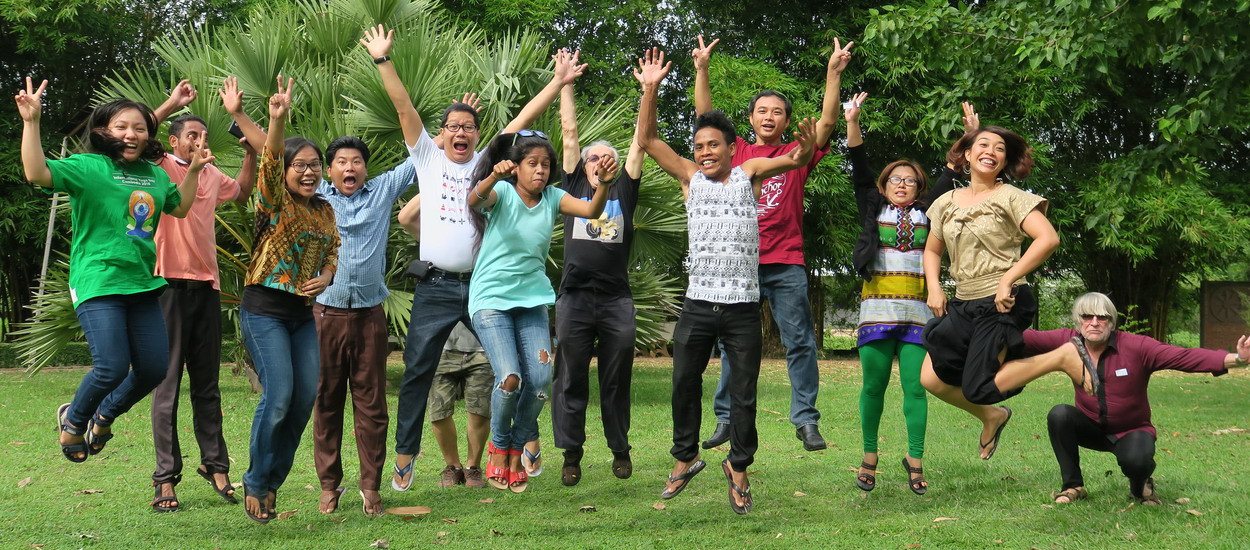
From August 8 to 22, a group of 11 Asian youths met in the Metta Karuna Center in Siem Reap, Cambodia, for a two-week Mini-School of Peace. The participants were selected by ICF’s two project holders, CCA and APAY, with the aim of promoting more cooperation between local YMCAs and churches and the ICF national forums. The participants came from Bangladesh, Indonesia, Timor-Leste, the Philippines, Myanmar, Thailand and Cambodia. Eight of the participants represented the YMCAs of these countries. They were Phongnarin Suwanma and Thon Layraman from Thailand, Bappu Mree from Bangladesh, Khon Mai from Myanmar, Alva da Silva from Timor-Leste, Hong Nay Ang from Cambodia, Puansari Meilina Siregar from Indonesia and Eleazar Blando from the Philippines.
Resourcing for this Mini-SOP was provided by Hem Sopharak, Bruce Van Voorhis and Max Ediger. Along with participatory sessions on identity; faith, religion and spirituality;dialogue and engagement; conflict, violence and war; and involving Socratic circles, the group also visited the nearby War Museum and attended the Phare Circus.
Joining the opening ceremony, Nam Boo Won, APAY General Secretary, shared words of encouragement with the participants. Duncan Chowdhury, Executive Secretary of APAY, attended the closing ceremony. All participants have now been introduced to the ICF national forums in their respective countries, and they will now be involved with their YMCAs in working with the ICF national forums in peace-building activities in their local context.
One of the YMCA participants, Puansari Meilina Siregar, a youth representing Jakarta YMCA, has shared with us her experience, which we append below.
Pray for the peace of humanity, pray for the peace of humanity
Pray for the peace of humanity, humanity shall live in peace
This song was often sung by the 11 participants representing the YMCA and CCA who came from seven countries of the Asia-Pacific region at the Mini-School of Peace, or Mini-SOP, from August 8 to 22, 2016. The song has become the essence of the 2016 Mini-SOP, which aimed to promote justice and peace for all humankind.
Comprehensive Learning
The 2016 Mini-SOP was organized by Interfaith Cooperation Forum (ICF). For me, this program was an opportunity and a very rewarding experience—an interactive learning process through discussions, role plays, group work, visits to museums, etc., that helped participants to think critically and independently to discover the meaning of learning. It was thus very interesting and also fun! SOP also equips the participants with the knowledge and skills that can be applied in our respective communities. A number of topics that were discussed in SOP, such as identity, conflict, poverty, human rights, the relation between justice and peace and the importance of citizen’s participation, were very helpful to strengthen our understanding regarding peace issues in order to have a proper foundation to promote peace. Practical learning materials, like the Socratic circle dialogue and community organizing, also increased our skill in working with the community.
In addition to the material presented, interaction with other participants who differ in language, religion, culture, perspectives and habits were also very useful and enriching. Interaction among participants of seven countries opened our eyes, realizing that differences are necessities.
Staying at the Metta Karuna Reflection Center was also an experience that will not be forgotten. Two weeks staying at Metta Karuna was an opportunity to take a distance from the hustle and bustle of everyday life and to focus on the meaning of life. In Metta Karuna, we learned to appreciate the environment by experiential learning, for example, by using water wisely and recycling. We also learned to appreciate the people who work every day to provide meals for us with many of them being landmine victims of the war.
For me, SOP 2016 was a comprehensive learning process, not only cognitive development, but it also changed our way of life towards affection and having a positive attitude.
Insights and Values
Comprehensive learning at SOP was a paradigm change in my life. It helped me to focus on what is really needed to be done in order to promote peace properly and effectively.
Firstly, the importance of moving from tolerance to acceptance to engagement—the difference is a necessity! The right attitude to face differences is not merely tolerance, but also involves togetherness in harmony.
Secondly, justice for peace—indeed, efforts in promoting peace are efforts to promote justice. True peace is not just a matter of the absence of violence but is also about how people live in justice and harmony. With this understanding, interfaith cooperation is needed to spread the good fundamental values of every faith and to work together to promote justice.
Thirdly, our vision is rebuilding the structure of education, politics, law and the new economy. It changed my paradigm from just helping people to help themselves to understanding the importance of rebuilding a new society. If people are only equipped with the ability to help themselves, it is just a kind of development activity that is fragile and does not last long! Society needs to be aware of the existence of the structures and systems that will affect their lives. This vision will help us to work properly and more effectively.
Fourthly, transformative approach—this approach is done by placing the people as the subject of change to make changes in society. By doing so, they will be more responsible for the decisions that affect them, and the results will be more sustainable. Transformation also talks about self-changing. Transformation starts from us. It is a lifelong process. Transformation is hope!
Lifelong Journey: Act for the Peace of Humanity
After the completion of SOP 2016, we have returned to our respective countries. The end of SOP 2016 is the beginning of our long journey to promote justice and peace. May the learning of justice and peace, and the hope and prayer for peace, be manifested through action in our lives. Thus, the lyrics above can be changed to
Pray for the peace of humanity, act for the peace of humanity
Pray and act for the peace of humanity, humanity shall live in peace
~ Puansari Meilina Siregar
YMCA of Timor Leste Visit
Having been appointed as the new MS Coordinator of the APAY, I was assigned to go on my first “mission trip” to YMCA of Timor Leste on July 19 until 27. The purpose of the visit is to understand and determine how far the YMCA is realizing its work/goals and complement/assist them in their needs in terms of their day to day operations, program development, membership building and other related matters.
The YMCA is located in the modest village of Terra Santa, Comorro, Dili . They have a small building with 3 rooms serving as their office, meeting room and the activity room for their Kids Program and other events. I was welcomed by the staff led by the General Secretary, Mr. Antonio da Silva when I came to their office. I had the opportunity to meet and get to know them and their Korean volunteer, Ms. Lee Hyun Jee who helps in the YMCA Kids Program by teaching them art, music, reading and playing games. The succeeding days were spent for meeting with GS Antonio and the finance/admin staff, Ms. Lourdes Lobato. We discussed their concerns for their programs, finances, government registration, personnel matter, the lot and YMCA office. We had sharing of ideas, suggestions , proposition on how to work out some possible actions on these concerns, how to network and partner with other agencies and plan some income-generating programs to help sustain their work and operation.
Currently, the YMCA has two main programs: the Soccer program and the Kids program. The Soccer program which is the well-known and favorite sport in Timor Leste, is highly participated by young people. YMCA conducts training for selected soccer teams, promote friendly matches in the name of “YMCA Cup” and participate in domestic leagues. The game is their way of developing and empowering the youth to have positive values and attitudes as well as providing them the venue for personal development. The program for the kids, on the other hand assists the children in building up their literary skills and love for the arts. There are two sessions/classes everyday held in the YMCA attended by 20 to 25 kids. The YMCA also had their Sewing Class for women but they suspended its operation temporarily due to lack of funds. They look forward to re-implementing this program once the funds are available.
I had the opportunity to visit the Peace Coffee Office and dialogue with their staff, too. They are presently doing well with their coffee shop operations because many students are patronizing it due to their cheaper price as compared to other coffee shops nearby, as well as the free use of their space for their brief meetings. Similarly, I was able to attend the meeting of the YMCA Board and witness their collegial discourse on YMCA matters. I had the chance also to talk with the Timor Leste Y President, Mr. Domingos Pereira through the initiative of their vice president, Mr. Orasio Mendes where he shared with me the programs and activities they had implemented in the past.
My 8- day visit in TL-Y afforded me to see and understand the challenges they are presently encountering. At this stage, they are still heavily dependent on the support from outsite – Partners Support Group of YMCAs. It will take maybe some more years for them to be on their own. Hopefully, all the stakeholders, the board and the staff will double their efforts to come up with meaningful action to address these challenges for them to evolve into a strong, alive and vibrant Association.
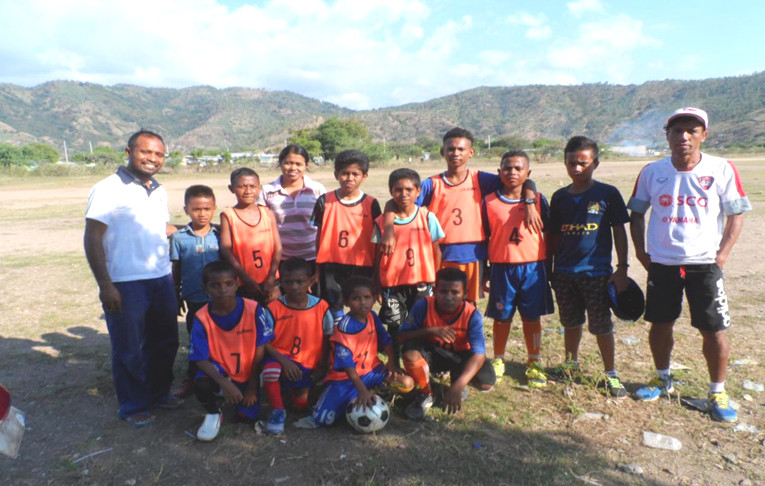 |
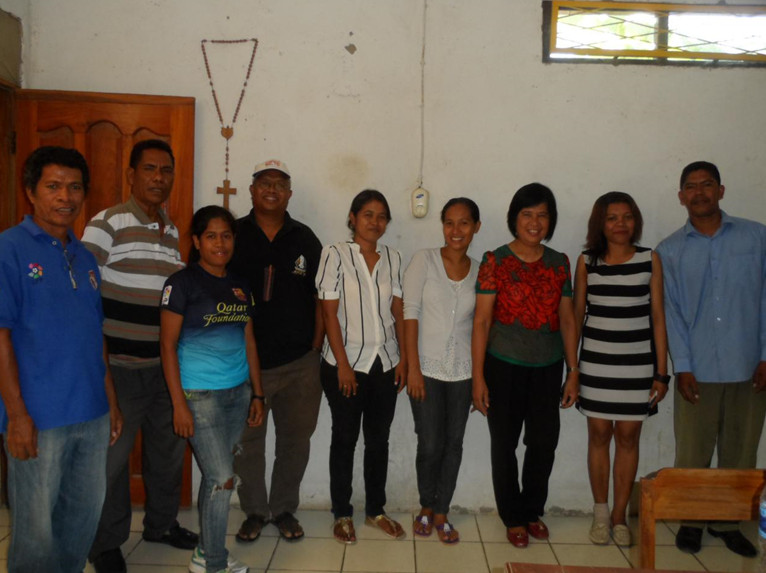 |
| ↑ Some members of the YMCA soccer team together with the staff in their training |
↑ Members of the TL YMCA Board together with the GS, Antonio da Silva, Lourdes Lobato, finance/Administrative staff and Thelma P. Juntereal, MS Coordinator |
~ Thelma P. Juntereal, Movement Strengthening Coordinator
|
